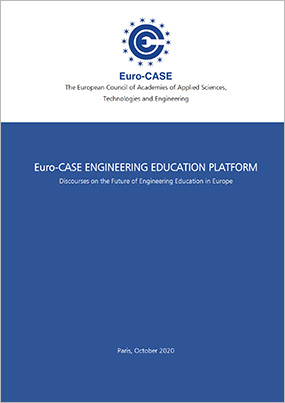Discourses on the Future of Engineering Education in Europe
Engineering Education, a European challenge for tomorrow
The Euro-CASE Committee on Engineering Education was tasked with examining the needs of engineering in relation to the education of future engineers in Europe. The Committee examined a wide range of literature, experiences from universities in different countries and information from the national Academies and the engineering industry and synthesised all of these through deep discussions within the committee and with specific entities in academia and industry who had been identified as having particularly relevant experience in the topic.
The findings of the committee are comprehensive and show the importance of considering the education, as well as the training, of future engineers to be a multifaceted endeavour that needs to bring together all stakeholders in the future European society in a combined endeavour. These findings can be summarised as a set of recommendations for universities, the national Academies, Professional Institutions, the education sector as a whole, and individual companies within the engineering industry.
Euro-CASE Committee on Engineering Education
Euro-CASE Committee on Engineering Education is an ad-hoc working group of 11 Euro-CASE member academies, which expressed interest in active participation in the operation of the Committee, appointed by the Euro-CASE Executive Committee and approved by the Euro-CASE Board at its meeting held in Lyngby, Copenhagen, Denmark, on November 15 2016.
On November 15 2016, the Euro-CASE Board fully approved the program proposed by the Platform’s Chairman.
This report represents a joint research result with equal contributions from each Committee member.
Platform members
- Chair: Petar B. Petrovic, Committee Chairman, Academy of Engineering Sciences of Serbia (AINS); Faculty of Mechanical Engineering, University of Belgrade, Serbia
- Albert Albers, National Academy of Science and Engineering (acatech), KIT-IPEK – Institute of Product Engineering, Karlsruhe Institute for Technology (KIT), Germany
- Hanna Bogucka, Polish Academy of Sciences (PAN), Institute of Wireless Communications, Poznań University of Technology, Poland
- Gerard Creuzet, National Academy of Technologies of France (NATF), France
- Janez Možina, Slovenian Academy of Engineering (IAS), Slovenia
- Jean-Louis Migeot, Royal Academy of Science, Letters and Fine Arts of Belgium (ARB), Belgium
- Kurt Richter, Austrian Academy of Sciences (ÖAW), Austria
- David Timoney, The Irish Academy of Engineering (IAE), College of Engineering & Architecture, University College Dublin, Ireland
- Nick Tyler, Royal Academy of Engineering (RAEng), Faculty of Engineering Science, University College London, United Kingdom
- Joos Vandewalle, Royal Flemish Academy of Belgium for Science and the Arts (KVAB), Belgium
- Petr Zuna, Engineering Academy of the Czech Republic (EACR), Czech Technical University in Prague, Czech Republic
A European challenge for tomorrow
Petr Zuna (EA CR) handed over in 2016 the Chairmanship of the Euro-CASE Engineering Education Platform to Petar Petrovich (AESS).
On November 15, the Euro-CASE Board fully approved the program proposed by the Platform’s new Chairman
Work activities of the Platform will be divided in 2 parts:
- Preparatory activities, which will be implemented by the end of 2016/beginning of 2017
- Work activities, which will be implemented in two phases during 2017 and 2018.
The objective of the kick-off meeting (venue to be determined) which should be organised at the end 2016/beginning 2017 will be:
- Setting up of the renewed working group and organizing the internal structure,
- Discussing the program with the aim to harmonize positions and priorities, and define the missing contents.
“Work activities” part will be divided in 2 phases:
Phase 1
Working meetings and internal consultations within Euro-CASE;;
External consultations and hearings at the level of the interested institutions (stakeholder consultations):
Systematization and processing of the collected information, generating of new work materials – core added-value activity of the Engineering Education Platform.
Phase 2
Finalizing consultations, collecting information and systematization
Drafting a final report: “Euro-CASE Position Paper on Engineering Education” and its presentation.




